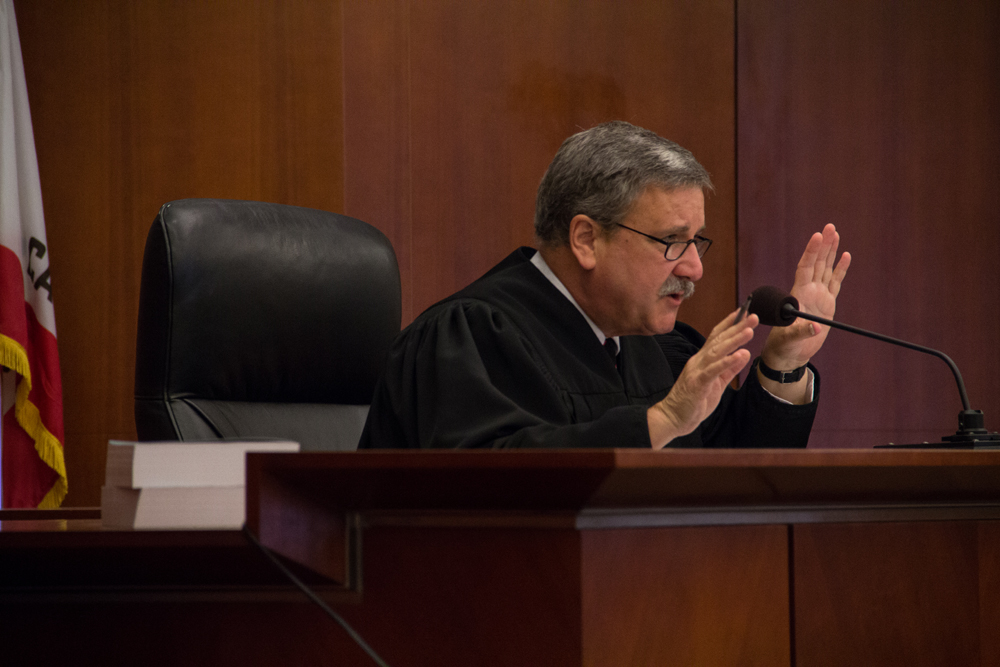Court ruling brings hope to City College

By Patrick Fitzgerald
The Guardsman
Judge Curtis Karnow’s tentative ruling revealed a mixed victory for City College citing that the Accrediting Commission for Community and Junior Colleges (ACCJC) 2013 accreditation termination decision was unlawful, however it left standing the original Order to Show Cause issued July 2012.
Judge Karnow issued a preliminary injunction in August 2013 which was in response to a lawsuit filed by the San Francisco City Attorney’s Office.
The temporary ruling Karnow issued Jan. 16 is to be finalized sometime after Feb. 3 and will mandate that the ACCJC provide City College with the right to present evidence of progress before a final accreditation decision, thus vacating the ACCJC’s accreditation termination order of July 2013.
“When today’s ruling is finalized by the judge, we will take the opportunity to ask the commission to reconsider its termination decision and we will present evidence, as we have for the last two years of our continued progress and commitment to meeting the accreditation standards.” Chancellor Dr. Arthur Tyler said in a statement released shortly after Karnow’s ruling.
Two days before, the ACCJC granted City College a two-year extension to become fully compliant under a recently instituted restoration process, this is another pathway towards compliance. Under this restoration process, the unproven compliance standards may be even stricter and therefore trickier than the previous high standards to be met under the original Order to Show Cause.
The ACCJC’s basis of the earlier Order to Show Cause centered on poor fiscal management, ineffective administrative governance and failure to properly measure learning outcomes. However, these issues were never formally presented to City College before 2012.
Long simmering issues between the ACCJC and City College date as far back as 2006. However, the quality of education was never an issue cited by the accreditation board and was actually cited favorably by the Student Success Scorecard survey released in 2014.
“The ruling is not what we hoped for,” mathematics instructor Ted Lee said. “It didn’t vacate the original ‘Show Cause’ but allows the commission to review any evidence that we want to provide on our behalf that we made progress on most of the standards.”
Judge Karnow did find convincing evidence that the ACCJC violated due process under the Unfair Competition Law (UCL). City College was given only one year before the ACCJC terminated accreditation without allowing City College the opportunity to present evidence of progress.
“We are extremely gratified that after a full evidentiary hearing and extensive briefing by the attorneys, Judge Karnow essentially found that the ACCJC did not do anything wrong with respect to its decisions regarding the accreditation of CCSF,” said Barbara Beno, president of the ACCJC.
Karnow noted that the UCL was designed to promote fair competition in commercial markets for goods and services and has never before been used to challenge an accreditation decision.
The U.S. Department of Education requirement that community colleges be accredited is essential for City College to be eligible for federal financial aid and for student’s course credits to be recognized by other higher education institutions.
“Finally, we have a ruling that says that the ACCJC was unfair and that they broke the law and that they need to remedy the situation,” said Tim Killikelly, “That is a really important step for CCSF and creating a fair accreditation process.” Killikelly is an instructor at City College and president of the American Federation of Teachers Local 2121.
In a statement issued Jan. 16, 2014, the City Attorney’s’ office said the contemplated injunction would allow City College to opt into a reconsideration process issued by the court, or opt out of the process by continuing with the restoration process accreditors created and approved for City College.
“They (ACCJC) would rather tell City College what they need to do and when they need to do it instead of it being a more cooperative effort to further what I imagine should be both sides goals which is to keep City College open but make it a more efficient college,” said former student Shun Trenholm.
Originally, the City Attorney’s Office lawsuit hoped to reset the entire accreditation evaluation process allowing City College to have a clean slate with regards to accreditation. However, Karnow’s narrow tentative ruling states that no remedy would be applied because there was no valid evidence of unfair process to vacate the ACCJC’s original sanction.
“This should serve as a loud, unequivocal wake-up call to accreditors — that they are subject to laws, and will face consequences for breaking them,” said City Attorney Dennis Herrera. “Though Judge Karnow didn’t go as far as we asked in terms of his proposed remedy, I am impressed with his thoughtful proposal for a tough, enforceable injunction that forces ACCJC to correct its violations and assures City College its due process rights.”
Karnow will be issuing his final ruling after the city attorney’s office submits input for a formal injunction and after he reviews ACCJC comments on the input provided.

Comments are closed.